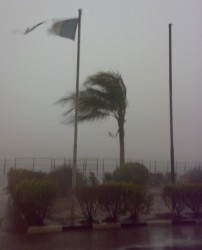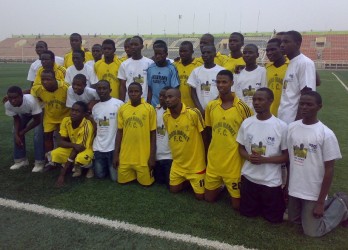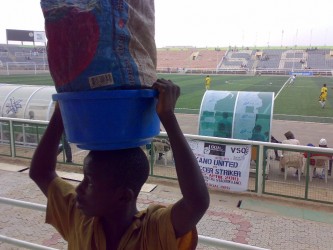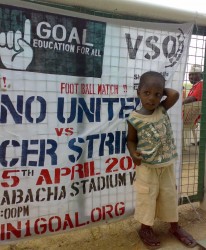If in March the weather was ‘unsettled’, in April it was most certainly stormy - both politically and climatically.

I’m writing this post at dusk in the Kano airport ‘waiting room’ (lounge would be too grand a word), as this season’s first serious storm blows. Outside a Lawrence of Arabia style sand storm has morphed into monsoon rain and my plane has returned to Abuja, unable to land. “Will it come back?” – “Wait and see!” smile the airline staff. So I've plenty of time to update on recent goings on.

The other weekend I was at the Sani Abacha Stadium in Kano again, for the first time since the Under 17 World Cup game I attended last October. This time it’s a low key event: Kano United versus Kurmi Market - that’s like Scunthorpe United against a non league team in the UK. The game was put on by the Nigerian Civil Society Action Coalition for Education for All, as part of the international FIFA backed 1-GOAL campaign. Sophie Tanner, a VSO volunteer based in Kano, had heroically battled against the odds to hire the stadium and arrange the teams and match officials.

A huge spectacular/world leader summit is planned for the World Cup this summer in South Africa to push for action to help Africa’s out of school kids, but the Kano stadium on a muggy afternoon proved a little less glamourous. Still, several hundred young men and teenagers watched a spirited game and younger hawkers circulated selling snacks and bags of ‘pure water’.

We needed to ‘on’ the generator for ‘light’ to use the loud speaker system. Just as the match got lively in the 2nd half with a hotly disputed off-side appeal against the first goal, the speakers crackled into life and the 1-GOAL message was delivered in Hausa – the lingua franca. Around a quarter of the estimated 30 million African kids out of school are Nigerian, many living in the North around Kano.
It’s a tragedy - what can be done to accelerate progress and enable all children to attend primary school by 2015? The new education minister Professor Rukayatu Rufai comes with a strong track record from her recent work improving Jigawa State’s school system so we wait in anticipation to see what ideas she puts forward.
Meanwhile after 3 hours in the airport we’re told the plane didn’t in fact refuel and come back, but has been cancelled for ‘operational’ reasons. The Nigerian passengers grumble a bit, but most are used to the uncertainties of local air travel and no one kicks up a fuss. At least we didn’t spend an hour in the air during a storm, as my colleague Alicia from Abuja did, trying to get to Kano on the same plane. As the multiple Nigerian air crashes graphically show, flying in the storm season is a particularly risky business…

4 comments
Comment by Justina ILOCHI posted on
Quite frankly I understand the plight of VSOs like Sophie "heroically battl(ing) against the odds" to arrange a "non (premier) league match. That is the reality of everyday living for the vast majority of poor people living in Nigeria. It is certainly a battle to simply exist. It is not only multiple air crashes ,it is also pedestrian disasters which make life a constant risk. The actual question Ian is not what has gone wrong with Nigeria but how DFID and other donor bodies measure their successes in Nigeria. Is it by the amount of funding they have made available to the country, the number of children in schools, improved girl -child education or improved governance? Non of these are as important if the education provided to Nigeria's children in Nigerian schools is not functional. Sustainable improvement depends on quality functional education not the numbers of children we chase into school. So my dear Ian your priorities are wrong. If you want change then look to and support quality provision.
Comment by Ian Attfield posted on
Hi Justina,
thanks for your comment.
At DFID we are well aware of the dilemma you pose about how to use UK taxpayers funds wisely. We try to balance in selected States examples of better ways of providing support (e.g. school grants and female teacher scholarships I've mentioned before on my posts) together with lobbying for reforms to how the government spends its much larger education spend (e.g. UBE Intervention Fund).
On quality we are investing alot in the coming months through ESSPIN on direct teacher training and support measures and on top of that funding learning assessment surveys to help track pupils outcomes.
I hope this gives you some re-assurance that within DFID we have at least some sense of the problems and myriad apporaches to offering support.
Comment by Christy Mclaren posted on
Your article is extremely interesting, but only tip toes over the real problem in countries such as Nigeria. For every child to attend primary school would be a fantastic achievement, but many simply cannot afford too or need to work to support their families.
I find it extremely difficult to stomach that, as I sit here in a comfortable office on my laptop drinking a mug of tea, many children in Africa and other countries are working tirelessly to make ends meat.
We always need to "do more", but as Justina says how do we measure the success? You cannot simply throw money at a problem and close your eyes. We need to get to the root core and stop it before it starts in my opinion.
Comment by Tunde Adegbola posted on
Hi,
I accidentally stumble on this piece in my research for an essay on poverty and corruption in Nigeria.
The genesis of all Nigeria problem is corruption. The money voted for projects whether Nigeria money or donor'smoney. The head teacher will steal the money if the politicians don't. It well known fact that most of the big money dissapear to Western countries and recently Dubai, South Africa and the likes. The story is the same in most other African countries. A good example is the Omar Bongo case in France.
I thinks the greatest service the Western so called donor countries can do will be to apply pressure on these rougues that impoverished thier people and live life of affluence in the western countries. Most of them have thier children in expensive school. It is time to start asking where did they get money to pay for thier wards education. There is no dounbt that the recent action on James Ibori, Alamaseigbha and Dariye has reduced the appetite for UK. UK is in position to influence other major players. I am convinced they will not take thier money to China, Iran or Russia. So UK will have influence on most countries that they will hide the stolen wealth.
Some may say the action must come from inside but from who. You don't expect the rogues to turn the heat on themselves. The anticorruption war will always be as it is untill we get some help from outside. With the amount of looted resources at their disposal in such an impoverished society hoping for free and fair election will be a dream.
It is now time to act.